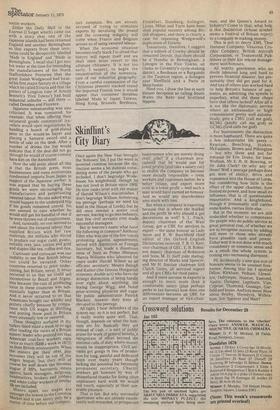Skinflint's City Diary
Once again the New Year brought the 'honours' list. I put the word in inverted commas because the distinction seems a bit dubious considering some of the people who get included. I don't begrudge Wodehouse his knighthood, though he has not lived in Britain since 1909'. He now ranks level with the maker of Harold Wilson's macintoshes. don't begrudge William Armstrong his peerage (perhaps we need his kind in the House of Lords), but he did once remind a senior civil servant, leaving to go into industry, that few civil servants ever made successful managers.
But in heaven's name what have the following in common? Anthony Eden who was one of the few voices protesting against appeasement, served with distinction as Foreign Secretary, but made a disastrous mess of Suez as Prime Minister; Marcia Williams who laboured for years under Harold Wilson as an efficient secretary; Messrs Balogh and Kaldor (the famous Hungarian economic double act) who have the strange distinction of being hardly ever right about anything; the boring George Wigg'; and Nobel prize-winning physicist and capable public administrator Patrick Blackett. Answer: they were all elevated to the peerage.
All right, I hear defenders of the system say, so it is not perfect. But it really works quite well. That, though, depends on what the honours are for Basically they are instead of cash — a sort of public praise for work of general benefit, a recognition of effort beyond the minimal calls of duty where money would be inappropriate. Civil servants get gongs in lieu of promotion for long, painful and dedicated work over, many years though lacking the potential for becoming permanent secretary. Charity workers get honours by way of shamefaced thanks for doing often unpleasant hard work we would not touch, especially at their miserable pittance.
That is fair. But why successful sportsmen who are already exorbitantly well rewarded, or prosperous businessmen who are merely doing their jobs? If a chairman proclaimed that he would aim for lower profits (and take a salary cut) to enable the company to become more socially responsible — treat workers and customers better, be a better citizen, and export more even at a lower profit — well such a man would have earned an honour. And so would any shareholders who stuck with him.
But when a company is exporting because that is where the market and the profit lie why should it get decorations as well? S. L. Finch, deputy chairman of the Weir Group, got a CBE for services to export — the same honour as Lady Snow and R. W. Burchfield chief editor of the Oxford English Dictionaries received. T. B. 0. Kerr, vice-chairman of GEC, E. B. Robinson deputy chairman of Robinson and Sons, M. D. Sieff joint managing director of Marks and Spencer, and Mr H. Sinclair chairman SSS Clutch Gears, all serviced export and all got CBEs for their pains.
And if mere success in exports is enough ' to merit more than a comfortable salary (plus perhaps perks in tax havens) how does one differentiate -between an OBE for an export manager or vice-chair man, and the Queen's Award to Industry? Come to that, what help is that distinction (whose symbol seems a Festival of Britain reject) to a company in making money.
This is not to decry EMI, Thor Hammer Company, Vesuvius Cru cible Company, British Aircraft Corporation, or Transworld Publishers or their kin whose management won honours.
All worthy gentlemen who no doubt laboured long and hard to prevent financial disaster, but presumably they did get paid for it. And lots of others also worked hard to help Britain's balance of payments, so, admitting the system is imperfect, what did these chaps have that others lacked? After all it is not like the diplomatic service where an ambassador or high commissioner pretty well automatically gets a CMG (call me god), KCMG (kindly call me god) or GCMG (God calls me god).
For businessmen the distinction is more haphazard. There are quite a few industrialist life peers — Kearton, Beeching, Stokes, McFadzean, Brown and Pilkington — but why them and not for instance Sir Eric Drake, Sir Isaac Wolfson, Mr E. R. H. Bowring, or Sir John Clark? Or why any of ,them? Well a peerage perhaps does get men of ability, drive and experience into the House of Lords, but considering how little is the effect of the upper chamber, how limited its power, and how small its influence, that is of questionable importance. And a knighthood, though it presumably still carries some kudos, carries little else.
But at the moment we are still undecided whether to compensate the people who do public service at great personal cost, of whether we are to recognise success by adding still more to those who already have plaudits cash and power. Either way it is not done with much consistency or common sense and as a .result the whole system is coming into increasing disrepute.
PS. Incidentally a sine qua non of honours -seems to be unusual forenames. Among this list I spotted Dillon, Kirkham, Pelham, Llewellyn, Dalrymple, Hunton, Esmond, Austin, Dampier, Lapthorn, Vize, Cyprian, Thomond, Gossage, Garfield and leuan. And lots more. How about Bealby, Meredyth, Wilbraham, Jon, Spencer and Mair?


























 Previous page
Previous page